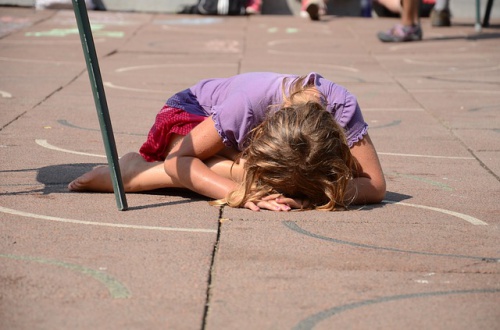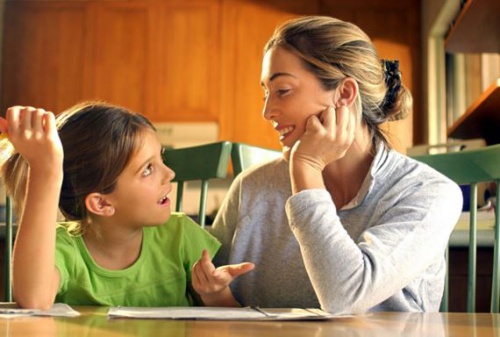Ways You Destroy Your Children's Self-Esteem


Written and verified by the psychopedagogue María José Roldán
Both adults’ and children’s self-esteem are one of the most important intangible assets of the human being. Without it, we are unable to make a positive assessment of ourselves that allows us to develop socially, protect ourselves, and love ourselves.
As parents we want our children to grow up so secure that we try to be omnipresent in their lives, regardless of the circumstance. So, without realizing it, we end up getting the opposite result.
Our words and actions are often not forming capable human beings but causing deep sadness and low (or sometimes null) self-esteem.
No one is born knowing how to be a perfect mother, father, uncle, grandfather, etc. And since we understand this, we will tell you below how you can develop certain habits to help take better care of your children’s self-esteem, and even strengthen it.
Have you ever felt bad about seeing your child with low self-esteem? Are you one of those parents who constantly tries to protect them from the world? If the answer to these questions is affirmative, it is time to reflect a bit on this.
Remember that children need their parents to love, support, guide and encourage them. Life can be quite a complex path and it is necessary to know how to be a good guide for the little ones to help them grow.
Self-esteem helps to build ourselves up. Thanks to good self-esteem and good psycho-emotional health, we can develop more positive attitudes and promote relationships and experiences that benefit our surroundings.
Self-esteem motivates and inspires
The Venezuelan psychologist Pablo Ríos Cabrera, in his book entitled Psychology: the adventure of knowing each other, says that self-esteem is related to expectations and success. That is, self-esteem compels us to grow, seek goals and generate certain expectations in order to achieve success with these goals.
For example, imagine that your daughter wants to be an astronaut. She will form certain expectations by which she will be achieving her dream. If she achieves this goal, it is an indicator of healthy self-esteem. If, on the contrary, it is too difficult for her to generate expectations in which she can see her dream come true, Houston, we have a problem.
Let’s continue analyzing the example a little more through the following possible scenarios:
Possible scenario #1: harming your children’s self-esteem
Your child tells you that she wants to be an astronaut when she is older. Next, we begin going around and around the issue and make some mistakes like:
- Wanting to help her with school tasks related to space that we end up doing completely by ourselves, believing that by having them “perfect” she will be better off. (It is good to participate actively in our children’s tasks but we must also give them space to think and resolve issues for themselves. We should not encourage dependence.)
- Yes, we buy her books and telescopes to see the stars but we do not allow her to assemble them by herself. We do it all ourselves. (It is one thing to supervise from a distance how it is being assembled and another thing is to make her feel useless by doing everything ourselves.)
- We do not take her to the planetarium or to any space-related programs, but we leave her at home, because there she “is better taken care of”. (Excessive protection greatly limits children, makes them feel insecure, anxious and of course, lowers their self-esteem.)
Result: The little one cannot imagine that she is going to be an astronaut because we have sabotaged the dream. By procuring everything we think she needs, we actually restrict her developmental possibilities and with that, her self-esteem.

Possible scenario #2
She tells us that she wants to be an astronaut when she is older. No matter how realistic or not this dream may seem to us, we proceed with the following:
- We collaborate with her every time she asks us for help with a school assignment related to space and space technology.
- We provide her with a telescope, book, toy, etc., related to the subject of her dream and allow her to explore it for herself from the first moment. If she has any problems, we can help, but not intervene at all in the process. The important thing is that she learns by herself and that she feels guided and supported.
- We better evaluate the proposal to go to the planetarium or start a space course. If we have the resources, why not point her towards them? If it doesn’t work out, at least she will not feel an “obligation” in the future when she thinks about it again.
CAUTION! If we do not have the resources to do an activity, the next best thing will always be to look for alternatives and try to spend quality time with our daughter. For example, why not organize a space movie night?

What happens if you do not allow them to make mistakes?
If children can not make mistakes and we overprotect them to prevent them from having a bad experience or making mistakes in general, they will not be able to function in life and will become dependent. They will also have a low self-esteem. They will think that making mistakes is a bad thing because “it hurts.”
Therefore, you should not steal the opportunity for them to learn from their mistakes, to admit that they are wrong and to give them the opportunity (and satisfaction) to solve issues on their own.
Teach your children to do things in the best possible way and to be responsible for their actions. This way they can have a healthy vision on mistakes and they will realize how useful mistakes are. They will thank you all their lives and you will feel more comfortable with yourself.
Go for it!
This text is provided for informational purposes only and does not replace consultation with a professional. If in doubt, consult your specialist.








